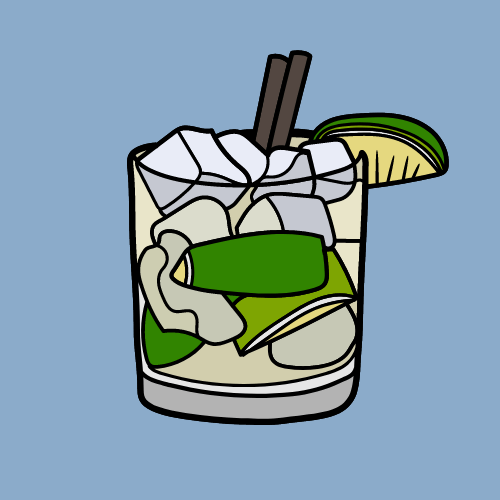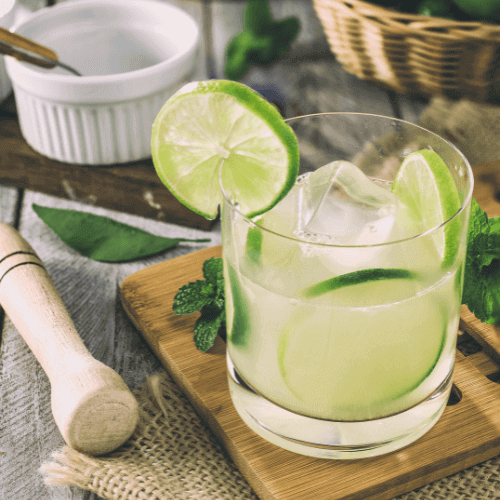Table of Contents The Love Potion Cocktail stands as a testament to the artistry of mixology. This enchanting cocktail, with...
Published: 03/04/24

The caipirinha, Brazil’s national cocktail, is a classic blend of simplicity and flavor, embodying the essence of the country’s rich culture and spirited traditions. Made with cachaça, sugar, and lime, this refreshing cocktail offers a glimpse into Brazil’s social and historical tapestry, particularly reflecting its roots in São Paulo. The caipirinha’s popularity extends beyond the Brazilian borders, finding a special place in Portugal’s bars and households, a testament to the enduring cultural ties stemming from three centuries of Portuguese colonization of Brazil.
There is a long-time debate about the origin of the caipirinha, shrouded in the mists of history, with various accounts contributing to its origin status. There is a general consensus among scholars that the cocktail originated in an interior of São Paulo, a region named Piracicaba, in Brazil, around 1918. This period was marked by societal upheavals and the global impact of the Spanish flu pandemic, a context that plays a crucial role in the narrative of the caipirinha’s creation. According to popular lore, the original recipe invented was a medicinal concoction made of cachaça, lemon, garlic, and honey, believed to alleviate the symptoms of the Spanish flu.
The caipirinha’s journey from a local remedy to an international sensation mirrors the paths of cultural exchange and colonization. The caipirinha popularity in Portugal underscores the deep-rooted connections between the two nations, a relationship forged through centuries of colonial history. The drink’s presence in Portuguese bars and homes is not merely a reflection of shared tastes but also of the intertwined histories and mutual influences that have shaped the identities of both countries.
It is essential to understand that Cachaça is the heart and soul of the caipirinha. Cachaça is a distilled spirit made from fermented sugarcane juice, a product of Brazil’s abundant sugarcane fields. Its history is as rich and complex as that of the country itself, tracing back to the 16th century when sugarcane was first introduced to Brazil by the Portuguese. Over the centuries, cachaça evolved from a drink of slaves and lower social classes to a celebrated national spirit, symbolizing Brazilian heritage and pride.
Cachaça’s production process is what gives it its distinctive flavor and character. The fresh sugarcane juice is fermented and then distilled, resulting in a clear, potent spirit that can be aged in wooden barrels to acquire additional flavors and complexity. This aging process differentiates cachaça from rum, another sugarcane-based spirit, which is typically made from molasses. The nuanced flavors of cachaça, ranging from grassy and herbal to woody and smooth, depending on the aging process, make it a versatile ingredient in mixology, particularly in the crafting of the caipirinha.
Beyond its refreshing taste, the caipirinha carries with it a cultural significance that transcends its ingredients. It is a symbol of Brazilian hospitality and joy, often enjoyed in social gatherings, reflecting the communal spirit of Brazilian culture. The ritual of preparing a caipirinha, from muddling the lime and sugar to mixing in the cachaça, is an act of sharing and celebration, an invitation to partake in a moment of leisure and camaraderie.
The caipirinha’s simplicity is deceptive, for within its basic components lies a depth of history and tradition. It embodies the syncretism of Brazil’s cultural heritage, blending indigenous, African, and Portuguese influences. The drink serves as a reminder of Brazil’s agricultural past, its colonial history, and its journey towards national identity and pride. In every sip, one can taste the sweetness of the sugar, the tang of the lime, and the spirit of cachaça, a trio that combines to perfection and tells the story of Brazil.
60 ml cachaça
1/2 lime, cut into wedges
2 teaspoons sugar
Ice
Garnish: lime wheel

Add the lime wedges and sugar into an old-fashioned glass.
Gently mash using a muddler.
Fill with ice, and add the cachaça.
Stir to combine.
Garnish with a lime wheel.
Our Team
Hi, we’re mixdrinkipedia team. Welcome to our cocktail corner of the web, crafted by our dedicated team, passionate about everything that makes mixology magical. We’re a group of enthusiasts and professionals, blending our diverse skills and backgrounds to create a space where the art of cocktails is celebrated from intricate recipes and deep dives into the history of cocktails to reviews on the latest in bar tools. Join us as we explore the art and science of mixology, one sip at a time.
Newest Recipes
Table of Contents The Love Potion Cocktail stands as a testament to the artistry of mixology. This enchanting cocktail, with...
Facebook Print Email WhatsApp Table of Contents The world of spirits and cocktails is a canvas where talented mixologists constantly...
Facebook Print Email WhatsApp Updated: 12/24/23 Table of Contents The Tokyo Iced Tea is a riff on the famous classic...
Table of Contents The Charlie Chaplin Cocktail is a delicate fusion of three key ingredients: apricot brandy, sloe gin, and...
MixDrinkiPedia.com is a participant in the Amazon.com Services LLC Associates Program. As an Amazon Associate we earn from qualifying purchases. Amazon and the Amazon logo are trademarks of Amazon.com, Inc. or its affiliates.